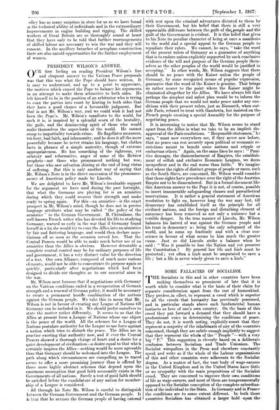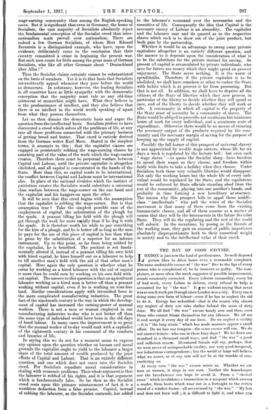SOME FALLACIES OF SOCIALISM.
THE Socialists in this and in other countries have been making themselves so prominent of late that it is worth while to consider what is the basis of their claim for separate consideration apart from the rest of humankind. They profess, in effect, to represent a creed which is superior to all the creeds that humanity has previously possessed, and in particular stands above such fundamental human instincts as love of one's own country. On the basis of this creed they put forward a -demand that they should have a predominant voice in determining the conditions of peace. They do not, it is worth noting, explicitly assert that they represent a majority of the inhabitants of any of the countries concerned, though they are subtle enough implicitly to suggest that they represent the whole of the " People "—with a very big " P." This suggestion is cleverly based on a deliberate confusion between Socialism and Trade Unionism. The Socialist wirepullers in the Press and elsewhere -constantly speak and write as if the whole of the Labour organizations of this and other countries were adherents to the Socialist dogma. As a matter of fact, the vast body of wage-earners in the United Kingdom and in the United States have little or no sympathy with the main propositions of the Socialist creed. They are concerned to improve their own conditions of life as wage-earners, and most of them are temperamentally opposed to the Socialist conception of the complete subordina- tion of the individual to the State. -In Germany and in France the conditions are to some extent different. In both these countries Socialism has obtained a larger hold - npon the wage-earning community than among the English-speaking races. But it is significant -that even in Germany, the home of Socialism, the vast majority of Socialists absolutely reject the fundamental-conception of the Socialist creed- that-inter- -nationalism melt prevail over nationalism. There are indeed- a few German Socialists, of whom Herr Eduard Bernstein is a distinguished example, who have, upon the evidence, deliberately come to the- conclusion that their country committed a crime in beginning the present war.
• But such men count for little among the great mass of German Socialists, who like all other Germans shout " Deutschland fiber Allen I" Thus the Socialist claims certainly cannot be substantiated on the basis of numbers. Yet it is to that basis that Socialists intermittently appeal whenever they pose before the world as democrats. In substance, however, the leading Socialists in all countries have as little- sympathy with the democratic conception that the majority must rule as any old-time aristocrat or monarchist might have. What they believe in is the predominance of intellect, and they also believe that there is no intellect in the world worth speaking of apart from what they possess themselves. •
Let ns then dismiss the democratic basis and argue the question from the intellectual basis. Socialists-profess to have discovered a creed.which solves all the problems of life, at any rate all those problems connected with the primary business of getting: bread and butter. That creed is entirely derived from the German writer Karl Marx. Stated in the simplest terms; it amounts to this : that the capitalist classes are engaged in persistently robbing the wage-earning classes by annexing part of the value of the work which the wage-earner creates. Therefore there most be perpetual- warfare between Capital and Labour, until the-private capitalist is altogether abolished, and all capital is concentrated in the hands of the State. More than this, as capital tends to be international, the conflict between Capital and Labour must be international also. In- place of the national rivalries, which the instinct of patriotism creates the Socialists would substitute a universal class, warfare- between the wage-earner- on the one hand. and the capitalist and his hangers-on upon the other. It will be seen that this creed begins with the assumption that the capitalist is robbing the wage-earner. But is that assumption true ? Take the simplest possible case of the employment of capital, the substitution of the plough for the spade. A peasant tilling his field with the plough will get through the work far more rapidly than if he dug it with the spade. It is therefore worth his while to pay something for the hire of a plough, and he is better off as long as the sum lie pays for the use of this piece of capital is less than what he gains by the substitution of a superior for an inferior instrument. Up to this point, so far from being robbed by the capitalist, he is benefited. The position is- not funda- mentally altered if, instead of a peasant tilling' his own field with hired- capital, he hires himself out as a labourer to help to till another man's field with the aid of that other man's capital, Here again the only question- is whether what he earns by working as a hired labourer with the aid of capital is more than he could earn by working on his own field with- out capital. The answer to this question is that an agricultural labourer working as a hired man is better off than a peasant working without capital, even if-. he is working, on rent-free land. Similar considerations apply with intensified force in the more complicated manufacturing industries. The great fact of the nineteenth century is the way in which the develop- ment of capital has increased the earning-power of manual workers. There is not a man or woman employed in our manufacturing industries to-day who is not better off than the same type of individual would have been in the old days of hand labour. In many cases the improvement is so great that-the manual worker of to-day would rank with a capitalist of the eighteenth century in his command of the comforts and luxuries of life.
In- saying this we do not for a moment mean to express any opinion upon the question whether on human and moral grounds the capitalist ought to yield to the labourer a larger share of the total amount of wealth produced by the joint efforts of Capital and Labour. That is an entirely different question, and one which does not enter into the Socialist creed. For Socialists repudiate moral considerations in dealing with economic problems. Their wholeargument is that the -labourer is robbed- of his rights, and it is that argument which is fundamentally false. So far then as the Socialist creed' rests upon this- primary misstatement of fact it is a worthless deduction from a false premiss. Capital, instead of robbing the -labourer, as the Socialist tiontencle,.has added to the labourer's command- over the necessaries and the amenities, of life. Consequently the idea that Capital is the necessary enemy of Labour is an absurdity. The capitalist and the labourer may and do quarrel as to the respective shares which each is to draw out of the joint product, but both gain by the partnership. Whether it would be an advantage to sweep away private capitalists altogether is an entirely different question, and the answer to it depends upon the consideration of what is to be the substitute for the private instinct for saving. At present all capital is accumulated by private individuals, who save for future use money which they might spend on present enjoyment. The State saves nothing. It is the worst of spendthrifts. Therefore, if the private capitalist is to be abolished, we shall have somehow or other to endow the State with habits which it at present is far from possessing. But that is not all. In addition, we shall hove to deprive all the citizens of the State of liberties which they now possess, in particular of the liberty to decide whether they will spend or save, and of the liberty to decide whether they will work or idle. A community in which all capital is the property of the State must of necessity be a community of slaves. The State would be obliged to prescribe not maximum but minimum hours of work for every individual, and a maximum scale of expenditure. Otherwise there would be no means of ensuring the necessary output of the products required by the com- munity and the necessary margin of saving for the purpose of keeping up the supply of capital.
Possibly the full horror of this prospect of universal slavery is not appreciated by weekly wage earners, whose life for six days a week is regulated by the factory bell ; but even such " wage slaves "—to quote the- Socialist slang—have freedom to- spend their wages as they choose, and freedom within fairly wide limits to take a holiday when they choose. Under Socialism both these very valuable liberties would disappear. Not only the working hours but the whole life of every indi- vidual would be regulated by the State, and the regulations would be enforced. by State officials standing aloof from the rest of the community, playing into one anther's hands, and probably in time forming a new hereditary aratocracy. The reason why this prospect fails to appal those middle- class " intellectuals " who pull the wires of the Socialist movement is that many of them come from the existing bureaucratic classes, and all of them assume as a matter of course that they will be the bureaucrats in the future Socialist State. They will do the regulating and the rest of the world will submit. In the meantime, by posing as the friends of the working man, they gain an amount of public importance absolutely disproportionate both to their numerical weight in society and to the intellectual value of their creed.



































 Previous page
Previous page